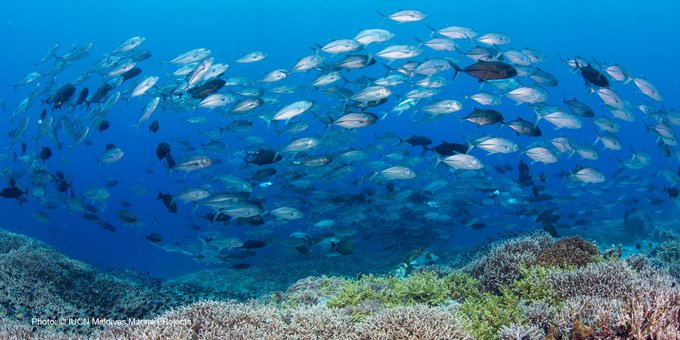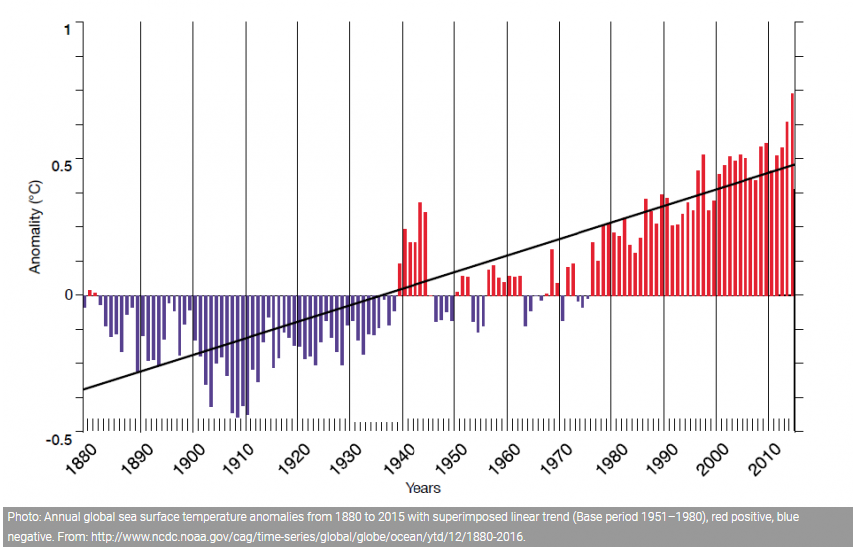With the ocean absorbing vast quantities of heat, increased concentrations of GHG are reported in the atmosphere, mainly from fossil fuel consumption. In fact, the Fifth Assessment Report published by the Intergovernmental Panel on Climate Change (IPCC) in 2013 indicated that the ocean had absorbed over 93% of the excess heat from greenhouse gas emissions since the 1970s. This is leading ocean temperatures to increase.
According to data from the US National Oceanic and Atmospheric Administration (NOAA), the average global sea surface temperature has increased by about 0.13°C per decade over the last 100 years.
However, the distribution of excess heat in the ocean is not uniform, with the most ocean warming taking place in the Southern Hemisphere and contributing to the subsurface melting of Antarctic ice shelves.
This fact is important as ocean warming reduces the amount of oxygen dissolved in the ocean, causing the thermal expansion of sea water and continental ice melting. The growing temperatures, along with ocean acidification, impact marine species and ecosystems.
Marine fishes, seabirds and marine mammals all face very high risks from increasing temperatures, including high levels of mortalities, loss of breeding grounds and mass movements as species search for favourable environmental conditions. Coral reefs are also affected by increasing temperatures which cause coral bleaching and increase their risk of mortality
IUCN said.
Regarding the impact of this situation, a 2012 report by the Food and Agriculture Organization of the United Nations estimates that marine and freshwater capture fisheries and aquaculture provide 4.3 billion people with about 15% of their animal protein. If distributions of fish stocks is changed, along with the increased vulnerability of fish species to diseases, ocean warming will prove to be a serious risk to food security and people’s livelihoods globally. Economic losses related to ocean warming are also potential.
Nevertheless, there are many things the world can done, in order to address climate change. IUCN suggests the following:
- Reducing GHG emissions: There is an urgent need to achieve the mitigation targets set by the Paris Agreement on climate change and hold the increase in the global average temperature to well below 2°C above pre-industrial levels;
- Protecting marine and coastal ecosystems: Well protected areas can conserve and protect ecologically and biologically significant marine habitats;
- Restoring marine and coastal ecosystems: Elements of ecosystems that have already experienced damage can be restored. This can done by building artificial structures that act as surrogate habitats for organisms, or enhancing the resilience of species to warmer temperatures through assisted breeding techniques;
- Improving human adaptation: Governments can introduce policies to keep fisheries production within sustainable limits. Coastal setback zones which prohibit all or certain types of development along the shoreline can limit the damage from coastal flooding and erosion. New monitoring tools can also be developed to forecast and control marine disease outbreaks;
- Enhancing scientific research: Governments can increase investments in scientific research to measure and monitor ocean warming and its effects. This will lead to more precise data on the scale, nature and impacts of ocean warming, making it possible to design and apply enough and appropriate mitigation and adaptation strategies.


































































